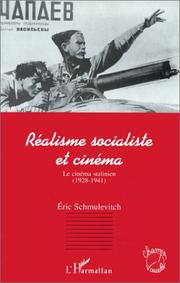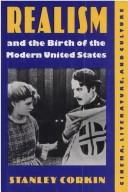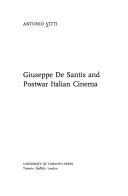| Listing 1 - 4 of 4 |
Sort by
|

ISBN: 273844024X 9782738440242 Year: 1996 Publisher: Paris : Editions L'Harmattan,
Abstract | Keywords | Export | Availability | Bookmark
 Loading...
Loading...Choose an application
- Reference Manager
- EndNote
- RefWorks (Direct export to RefWorks)
Motion pictures --- Socialist realism in motion pictures. --- History.
Book
ISBN: 2858932786 Year: 1996 Volume: 1 Publisher: Paris : J.M. Place,
Abstract | Keywords | Export | Availability | Bookmark
 Loading...
Loading...Choose an application
- Reference Manager
- EndNote
- RefWorks (Direct export to RefWorks)
Motion pictures --- Realism in motion pictures --- Cinéma --- Réalisme dans le cinéma --- History --- Histoire

ISBN: 0820317306 Year: 1996 Publisher: Athens ; London The University of Georgia Press
Abstract | Keywords | Export | Availability | Bookmark
 Loading...
Loading...Choose an application
- Reference Manager
- EndNote
- RefWorks (Direct export to RefWorks)
Littérature réaliste --- Neorealism (Literature) --- Neorealisme (Literatuur) --- Néoréalisme (Littérature) --- Realism (Literary movement) --- Realism in de film --- Realism in literature --- Realism in motion pictures --- Realism in moving-pictures --- Realisme (Letterkundige beweging) --- Realisme (Literaire beweging) --- Realisme in de literatuur --- Realistische literatuur --- Réalisme (Mouvement littéraire) --- Réalisme au cinéma --- Réalisme dans la littérature --- American fiction --- -Motion pictures --- -Realism in literature --- Motion pictures and literature --- -#SBIB:309H1320 --- #SBIB:309H521 --- #SBIB:AANKOOP --- Literature and motion pictures --- Moving-pictures and literature --- Literature --- Motion pictures --- Magic realism (Literature) --- Mimesis in literature --- American literature --- Cinema --- Feature films --- Films --- Movies --- Moving-pictures --- Audio-visual materials --- Mass media --- Performing arts --- History and criticism --- History --- De filmische boodschap: algemene werken (met inbegrip van algemeen filmhistorische werken en filmhistorische werken per land) --- Audiovisuele communicatie: inhoudsanalyse: onderzoekingen --- United States --- Civilization --- -American fiction --- -Littérature réaliste --- 20th century --- Culture in motion pictures --- #SBIB:309H1320

ISBN: 1282008137 9786612008139 1442675357 0802071414 0802007759 9781442675353 9781282008137 9780802007759 9780802071415 Year: 1996 Publisher: Toronto
Abstract | Keywords | Export | Availability | Bookmark
 Loading...
Loading...Choose an application
- Reference Manager
- EndNote
- RefWorks (Direct export to RefWorks)
One of the founding fathers of the Neo-realist movement and a Communist dedicated to populist filmmaking, Guiseppe De Santis (b. 1917) has been a significant force in Italian cinema. In spite of his crucial contribution De Santis has received little critical recognition and his work has been largely excluded from the canon of traditional cinematic teaching. In this first book-length study of De Santis, Antonio Vitti explores the filmmaker's life and work, and addresses why he has been marginalized as a result of the politics of critical reception in Italian cinema and within the academy. Through critical analysis of such films as Riso amaro (Bitter Rice), Non c'e pace tra gli ulivi ( No Peace Among the Olives), and Cesta Duga Godinu Dana (The One-Year-Long Road), Vitti offers an informative profile of a director who refused to compromise what were often unpopular political and aesthetic principles. De Santis emerged as a strong opponent of government censorship in Fascist Italy and strove throughout his career to remain faithful to his political objectives: to create a genuine popular narrative voice, and to offer, through filmmaking, a form of entertainment for the masses and a means of promoting social and political change. At the same time, possessed of considerable technical abilities and a passion for formalized beauty and sensuality, De Santis resisted the rigid rules for socio-realistic representation dictated by the Soviet Union. He conformed neither to the mainstream nor to the leftist critical expectations of his day. He anticipated, in his own critical approach, the direction of contemporary film theory, and focused on the role of the medium itself as a means of mass communication and a repository of collective imagination.Vitti draws on his extensive personal interviews with De Santis as well as on the latter's previously unpublished writings. This volume captures the intelligence, passion, aesthetic flair, and occasionally fiery temperament of this important filmmaker.
Motion pictures --- Realism in motion pictures. --- Motion picture producers and directors --- History. --- De Santis, Giuseppe, --- Realism in moving-pictures --- Biography. --- Santis, Giuseppe de, --- De Santis, Beppe, --- Santis, Beppe de, --- De Santis, Beppe --- Italien --- Italy. --- Italia --- Italian Republic --- Italianska republika --- Italʹi͡anskai͡a Rėspublika --- Italie --- Italii͡ --- Italii͡a Respublikasi --- Italiĭsʹka Respublika --- Itālija --- Itālijas Republika --- Italijos Respublika --- Italikē Dēmokratia --- Īṭāliy --- Italiya Respublikasi --- It'allia --- It'allia Konghwaguk --- İtalya --- İtalya Cumhuriyeti --- Iṭalyah --- Iṭalye --- Itaria --- Itaria Kyōwakoku --- Jumhūrīyah al-Īṭālīyah --- Kgl. Italienische Regierung --- Königliche Italienische Regierung --- Laško --- Lýðveldið Ítalía --- Olasz Köztársaság --- Olaszország --- Regno d'Italia --- Repubblica italiana --- Republiḳah ha-Iṭalḳit --- Włochy --- Yidali --- Yidali Gongheguo --- Italy --- Königreich Italien --- Repubblica Italiana --- Olaszorszaǵ --- Olasz Koz̈taŕsasaǵ --- Italienische Republik --- République Italienne --- Yidali-gongheguo --- Italiener --- Königreich Sardinien --- Republik von Salò --- 17.03.1861 --- -Motion pictures
| Listing 1 - 4 of 4 |
Sort by
|

 Search
Search Feedback
Feedback About UniCat
About UniCat  Help
Help News
News